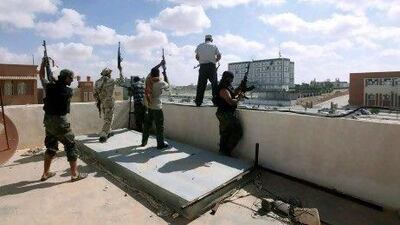Residents of the one-time Qaddafi stronghold of Bani Walid are at risk of revenge attacks by government-aligned forces who have entered the town, a rights group warned yesterday.
The warning from Human Rights Watch (HRW) came after fierce fighting in Bani Walid in the past week underlined some of the problems facing Libya's new government.
Militiamen from Misurata, with which Bani Walid has a long rivalry fostered by Qaddafi, gathered outside Bani Walid in early October.
Last week, the men were given orders by the interim government to stage an assault on the town and the ministry of defence declared yesterday that the area had been flushed of fighters loyal to the former Libyan dictator.
"The situation in Bani Walid is good, the problem is over," a spokesman for the ministry said yesterday.
The outgoing Libyan prime minister Abdurrahim Al Keib said that major military operations in the town were over, and that many people from the "military establishment of the former regime" had been arrested.
It was possible, he added, that some military presence would remain in some areas for the protection of civilians.
But HRW said that the government should make it clear that revenge attacks and destruction of property by troops entering the town, 170 kilometres south-east of Tripoli, would be punished. Doctors in the town have told the group that several people not associated with any militia have been killed in the fighting and thousands of families have evacuated the area.
Although the military action in Bani Walid was endorsed by the interim government and chief of staff, the aggression, according to residents of Bani Walid and others, began as an act of revenge by forces from Misurata, a coastal city 190km east of the capital.
They say the arrest and shooting in Bani Walid of Omran Shaaban, a Misuratan credited with finding and killing Qaddafi, sparked the violence. Shaaban later died in hospital in France.
Residents claimed that militia from Misurata set up checkpoints, prevented food, fuel and medicine from entering the town and fired into civilian neighbourhoods.
There is some doubt as to how much the central authority is pressured by militias which, while allied with the government, still exercise a degree of autonomy and have more weapons than the government at their disposal.
"The government tries to put in place arrangements to make sure that [the militias] come under the command and control of its agencies," said one western official familiar with Libyan security, who requested anonymity to discuss sensitive subjects.
"I don't know if the arrangements would withstand scrutiny - has every single manoeuvre been approved?"
Reports confirmed by government officials that the assault had resulted in the detention of Qaddafi's son, Khamis, and spokesman, Moussa Ibrahim, which sparked wild celebrations in Tripoli and lent credibility to the operations, have proved to be false.
Meanwhile, in Tunisia, an interior ministry spokesman said that one man had been arrested and charged in connection with the September 11 attack in Libya's eastern city of Benghazi that killed the US ambassador and three other Americans.
The suspect, Ali Hamzi, has been charged with membership of a terror group abroad - a charge he denies, according to his lawyer.

